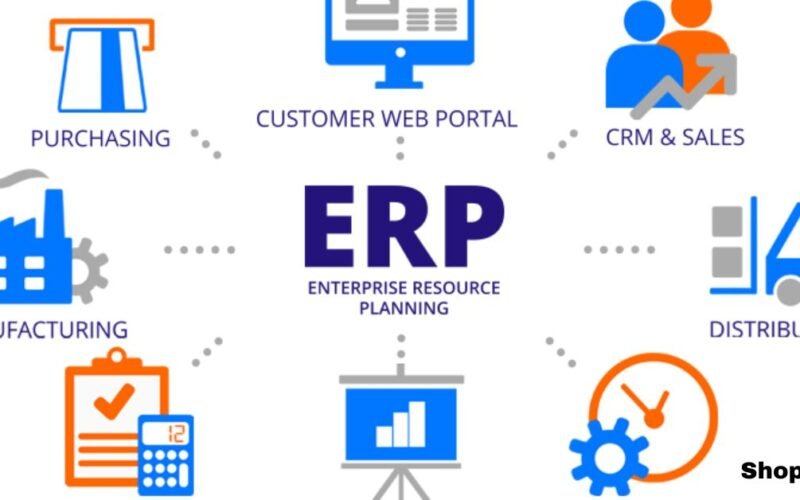Managing an online store requires juggling multiple tasks: processing orders, managing inventory, tracking customer data, and more. As your business grows, these tasks can quickly become overwhelming. This is where Enterprise Resource Planning (ERP) systems come into play. ERP solutions integrate various business functions into a single system, providing you with real-time data and streamlining operations. Shopify ERP integration takes this a step further by syncing your e-commerce platform with your backend processes for a seamless business experience.
In this article, we will explore five powerful ERP solutions for Shopify integration that can transform your business. Whether you’re looking to improve inventory management, optimize order fulfillment, or gain deeper insights into financials, these solutions will help you streamline operations and boost efficiency. Read on to learn how to unlock the full potential of Shopify ERP integration!
1. What is Shopify ERP Integration and Why Is It Important?
Before diving into the top ERP solutions, it’s important to understand the concept of Shopify ERP integration. ERP software enables businesses to manage key functions like accounting, inventory, human resources, procurement, and customer relationship management (CRM) from a unified platform. Shopify ERP integration connects your Shopify store with your ERP system, ensuring that data flows seamlessly between them.
Why Should You Integrate ERP with Shopify?
- Centralized Data: No more switching between multiple software programs. Integration ensures all your business data is in one place, making decision-making easier and faster.
- Improved Accuracy: Automatic data syncing reduces human error, leading to more accurate inventory management, order processing, and financial reporting.
- Better Customer Experience: Real-time inventory updates and faster order fulfillment enhance your customers’ shopping experience, driving higher satisfaction and repeat purchases.
- Scalability: As your business grows, a powerful ERP system will ensure that your operations can scale efficiently without losing control.
Now, let’s take a closer look at five ERP solutions that can supercharge your Shopify store!
2. 1. NetSuite ERP: A Comprehensive Solution for Growing Businesses
NetSuite is one of the most robust ERP systems available, offering everything from financial management to inventory tracking. With native integration to Shopify, it’s a powerful solution for businesses looking to scale operations seamlessly.
Key Features:
- Financial Management: Automate billing, accounting, and revenue recognition to streamline your financial operations.
- Inventory and Order Management: Real-time updates on stock levels and automated order processing to reduce errors and improve fulfillment speed.
- CRM Integration: Manage customer relationships with a built-in CRM, allowing you to personalize marketing and sales efforts.
Why Choose NetSuite for Shopify Integration?
- Scalability: NetSuite is designed to grow with your business, making it ideal for expanding operations.
- Customizability: Tailor the system to meet the specific needs of your business, with options to customize workflows, reports, and dashboards.
- Cloud-Based: Access your data from anywhere, ensuring flexibility for remote teams and global operations.
Actionable Tip: Leverage NetSuite’s real-time analytics to make data-driven decisions about product stock levels, customer preferences, and sales forecasts.
3. 2. TradeGecko (QuickBooks Commerce): The Ideal Choice for Small to Mid-Sized Businesses
TradeGecko, now known as QuickBooks Commerce, is a cloud-based inventory and order management platform that integrates seamlessly with Shopify. It’s perfect for small and medium-sized businesses looking for an intuitive solution that doesn’t require a steep learning curve.
Key Features:
- Multi-Channel Selling: Sync products, inventory, and orders from multiple sales channels, including Shopify, Amazon, and eBay, into one system.
- Inventory Tracking: Keep a close eye on stock levels, with automatic alerts when inventory is running low.
- Order Management: Streamline the entire order process, from order creation to fulfillment, with real-time updates across platforms.
Why Choose TradeGecko for Shopify Integration?
- User-Friendly Interface: A clean and simple interface makes it easy for users to manage complex business processes without being overwhelmed.
- Affordable for SMBs: The pricing model is designed with small to mid-sized businesses in mind, making it a cost-effective ERP solution.
- QuickBooks Integration: Syncs easily with QuickBooks for accounting and financial reporting, giving you a comprehensive solution for both operations and finances.
Actionable Tip: Take advantage of TradeGecko’s multi-channel inventory management to avoid stockouts or overstocking by tracking your inventory in real time across platforms.
4. 3. SAP Business One: Advanced ERP for Established Businesses
SAP Business One is an ERP solution designed for growing businesses that need more advanced functionality. It’s an excellent choice for Shopify merchants who have complex workflows or need deep financial and operational insights.
Key Features:
- Comprehensive Financial Management: Manage everything from general ledger to accounts payable/receivable, making accounting processes more efficient.
- Inventory and Distribution Management: Control stock levels, streamline order fulfillment, and monitor supply chain performance in real time.
- Reporting and Analytics: Advanced reporting tools allow you to analyze business performance and identify opportunities for growth.
Why Choose SAP Business One for Shopify Integration?
- Industry-Leading Technology: SAP is known for its cutting-edge technology and robust capabilities, making it suitable for complex, multinational businesses.
- Customization: SAP offers high levels of customization, allowing you to tailor workflows, reporting, and user interfaces to your business’s needs.
- Global Reach: Ideal for businesses with global operations, SAP Business One can support multiple languages, currencies, and tax rules.
Actionable Tip: Use SAP Business One’s advanced reporting tools to analyze your customer data and discover purchasing trends that can inform your marketing strategy.
5. 4. Brightpearl: Perfect for Retailers and Wholesalers
Brightpearl is an ERP solution built for retail and wholesale businesses, making it ideal for Shopify merchants who deal with both physical products and multi-channel sales.
Key Features:
- Order and Inventory Management: Track orders, manage stock levels, and automate back-end processes, all from one platform.
- Accounting Automation: Automatically sync sales, purchases, and payments with integrated accounting features.
- Multi-Channel Integration: Integrates with not just Shopify, but also other platforms like Amazon, eBay, and Walmart.
Why Choose Brightpearl for Shopify Integration?
- Streamlined Workflow: The platform automates manual processes, allowing you to focus more on growing your business rather than handling administrative tasks.
- Omnichannel Support: Perfect for retailers that sell on multiple platforms, Brightpearl helps you manage inventory, orders, and finances from one system.
- Real-Time Data: Real-time insights into sales, stock, and customer behavior help you make informed decisions quickly.
Actionable Tip: Use Brightpearl’s reporting capabilities to track product performance across multiple sales channels, ensuring you are optimizing your best-selling products.
6. 5. Odoo ERP: Flexible and Open-Source Solution
Odoo is an open-source ERP solution that offers a high degree of flexibility and customization. It’s an excellent choice for Shopify merchants who want an affordable and scalable ERP that can be tailored to their specific needs.
Key Features:
- Custom Modules: Choose from a range of modules that allow you to add functionality such as project management, CRM, e-commerce, and more.
- Inventory and Supply Chain Management: Track inventory, manage warehouses, and optimize order fulfillment.
- Integration with Shopify: Odoo integrates seamlessly with Shopify, allowing for automatic syncing of orders, inventory, and customer data.
Why Choose Odoo for Shopify Integration?
- Cost-Effective: Odoo’s open-source nature allows businesses to access powerful ERP features at a fraction of the cost of proprietary solutions.
- Customization: With thousands of available modules, you can build an ERP solution that perfectly suits your business requirements.
- Community Support: Odoo has a large community of developers and users who share solutions, modules, and best practices.
Actionable Tip: If you have unique business needs, consider customizing Odoo with additional modules to optimize workflows, customer service, or analytics.
Conclusion:
Seamlessly integrating an ERP system with Shopify is a game-changer for businesses looking to streamline operations and scale efficiently. Whether you’re a small retailer or an established enterprise, there is an ERP solution out there to fit your unique business needs. From NetSuite’s scalability to Odoo’s flexibility, these five solutions can help you enhance productivity, improve inventory management, and boost your bottom line.
Take Action: Ready to unlock the power of Shopify ERP integration? Explore these five powerful solutions today and start transforming your business operations!
For more information visit Shopify ERP

